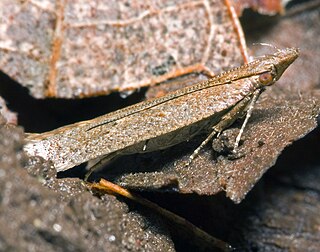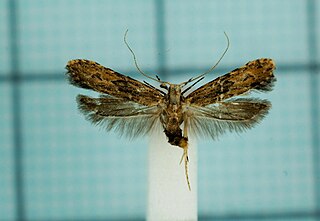
The Gelechiidae are a family of moths commonly referred to as twirler moths or gelechiid moths. They are the namesake family of the huge and little-studied superfamily Gelechioidea, and the family's taxonomy has been subject to considerable dispute. These are generally very small moths with narrow, fringed wings. The larvae of most species feed internally on various parts of their host plants, sometimes causing galls. Douglas-fir (Pseudotsuga) is a host plant common to many species of the family, particularly of the genus Chionodes, which as a result is more diverse in North America than usual for Gelechioidea.
Dendrophilia is a genus of moths in the family Gelechiidae.

Helcystogramma is a genus of moths in the family Gelechiidae. The genus was erected by Philipp Christoph Zeller in 1877.

Monochroa is a genus of moths in the family Gelechiidae.

Dichomeridinae is a subfamily of moths in the family Gelechiidae.

Dendrophilia petrinopsis is a moth of the family Gelechiidae. It is found in Russia, Japan (Honshu) and Taiwan.
Anarsia protensa is a moth of the family Gelechiidae. It was described by Kyu-Tek Park in 1995. It is found in Japan and Taiwan.
Dendrophilia albidella is a moth of the family Gelechiidae. It was described by Snellen in 1884. It is found in Russia.
Dendrophilia mediofasciana is a moth of the family Gelechiidae. It was described by Kyu-Tek Park in 1991. It is found in Russia, Korea and Honshu, Japan.
Dendrophilia neotaphronoma is a moth of the family Gelechiidae. It was described by Ponomarenko in 1993. It is found in Russia, Korea and Taiwan.
Dichomeris apludella is a moth of the family Gelechiidae. It was described by Julius Lederer in 1869. It is known from Iran.
Dichomeris aprica is a moth of the family Gelechiidae. It was described by Edward Meyrick in 1913. It is known from Karnataka in southern India.

Chionodes distinctella, the eastern groundling, is a moth of the family Gelechiidae. It is found in almost all of Europe, as well as most of Russia, Kazakhstan, Central Asia and North Africa. The habitat consists of dry, rocky heath and meadows and the verges and rough pastures.
Helcystogramma hassenzanensis is a moth in the family Gelechiidae. It was described by Kyu-Tek Park and Ronald W. Hodges in 1995. It is known from China and Taiwan.

Helcystogramma hibisci is a moth in the family Gelechiidae. It was described by Stainton in 1859. It is known from China, Taiwan, India, Thailand, Vietnam, Sri Lanka, Indonesia and Australia, where it has been recorded from the Northern Territory and Queensland.
Helcystogramma immeritellum is a moth in the family Gelechiidae. It was described by Francis Walker in 1864. It is known from Java in Indonesia and from Sri Lanka.

Scrobipalpa atriplicella, the goosefoot groundling moth, is a moth of the family Gelechiidae. It is found from most of Europe throughout Asia to Kamchatka and Japan. It is an introduced species in North America.

Thiotrichinae is a subfamily of moths in the family Gelechiidae.
Scrobipalpula tussilaginis is a moth in the family Gelechiidae. The original publication for the name appears to be by Stainton in 1867, but it is sometimes attributed to Frey. It is found in Great Britain, Sweden, the Netherlands, France, Germany, Denmark, Austria, Switzerland, Italy, Poland, the Czech Republic, Slovakia, Slovenia, Hungary, Romania, the North Macedonia, Greece, Ukraine and Russia.
Ronald William Hodges, known as Ron, was an American entomologist and lepidopterist.






